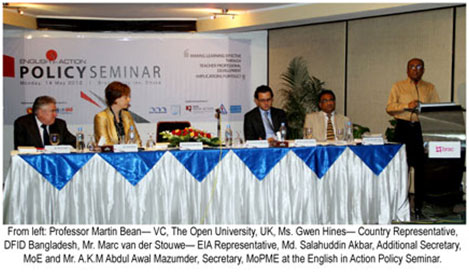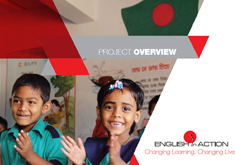On 14th May 2012, a policy seminar was organized by English in Action (EIA), a large-scale UK Aid funded project in Bangladesh working on developing teachers’ knowledge and skills to teach English to primary and secondary school children. The seminar titled ‘Making learning effective through teacher professional development — implications for policy’, aimed to generate discussion around the Continuous Professional Development (CPD) policy in Bangladesh, current practices in the primary and secondary sectors as well as share the experience and impact of EIA teacher professional development programme with a group of key policy makers, leading educationists, practitioners working in the development sector and donor representatives in Bangladesh.
Mr Marc van der Stouwe, English in Action Representative, in his opening speech highlighted the need for a school-focused, evidence-based and flexible approach to teacher professional development and the necessity of the Government of Bangladesh and English in Action to work together in implementing this approach. The Additional Secretary, Ministry of Education (MoE), Government of Bangladesh, Md. Salahuddin Akbar reiterated the commitment of the Government of Bangladesh in extending support and improving the quality of the teacher professional development programmes through innovative initiatives such as English in Action. This was further emphasized by the Chief Guest Mr. A.K.M Abdul Awal Mazumder, Secretary, Ministry of Primary and Mass Education (MoPME), Government of Bangladesh, who referred to this ‘partnership’ as key to success at a large scale. Mr M. Nazrul Islam Khan, PS-I (Secretary) to Prime Minister and National Project Director of Access to Information Program also added his appreciation to preparing teachers for delivering quality education for school students. Professor Martin Bean, Vice-Chancellor, The Open University, UK mentioned that the work of EIA is celebrated internationally and emphasized that such high quality teacher education programmes are only sustainable if it is embedded within the mainstream education programmes and policies. Ms. Gwen Hines, Country Representative, DFID Bangladesh highlighted the core purpose of on-going teacher development, especially in the field of education and its implications on students’ learning in an ever-changing world. She also emphasized the importance of teacher professional development under PEDP III and its impact on the quality of teaching in Bangladesh.

Drawing on the national and international experiences of CPD, the participants took part in constructive thematic discussions about how best to address the need for teachers’ ‘school-based’ professional development in Bangladesh with regard to creating effective and supportive learning environment for teachers’ in schools, training, monitoring, evaluation and the role of central administration. As an example of good practice, English in Action has been cited in the CPD Policy Framework for primary teacher education in Bangladesh. However, the teacher professional development activities and communicative language practices promoted by English in Action are likely to ‘die out’ beyond 2017, unless they become embedded within the existing national programmes, including pre-service and in-service mechanisms as well as school and teacher training curriculums. Overall, the participants stressed that the seminar contributed to broadening and deepening of mutual understanding of both opportunities and challenges of school-based teacher professional development in Bangladesh. They also emphasised that future planning would benefit from a continued dialogue on the topic between the Government, donors and other organizations working in the education sector.






